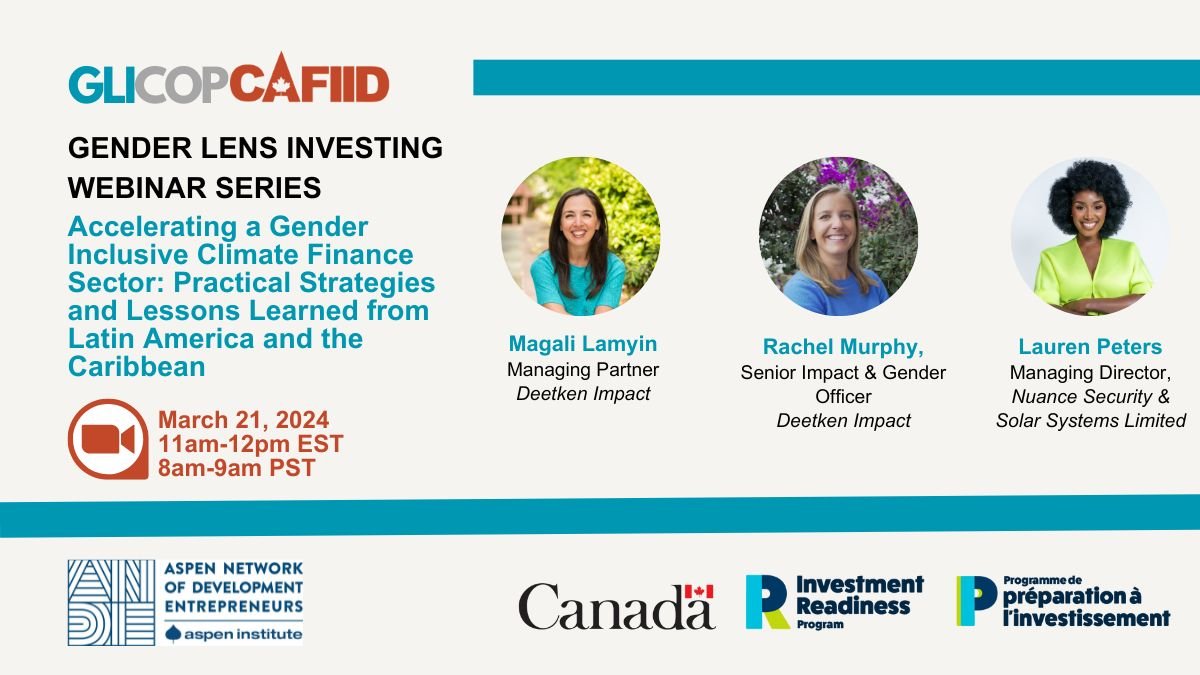Key takeaways
Many of these apply to gender lens investing across sectors, though some are specific to the climate finance space given its particular dynamics and the fact that it is male dominated:
Women have a critical role to play in the renewable energy sector. However, given it is a male dominated space there is a need to showcase the work of women leaders who can serve as role models for other women who aspire to work in this area. Lauren Peters of Nuance Solar is an excellent example of a woman entrepreneur / electrical engineer from Trinidad and Tobago who is inspiring women and young people to become interested in clean energy in order to improve their quality of life and that of their households.
Collaborations between investors are critical to amplify impact. We heard about a co-investment between Deetken Impact and IDB Invest, whereby Deetken offered capital and customized a TA engagement to an energy firm in the Caribbean; this catalyzed a loan IDB Invest who structured it to allow for reduced interest rates based on the achievement of pre-determined gender targets.
Education and awareness of all stakeholders regarding gender gaps in the climate finance sector and the benefits that equitable business strategies bring to overall business performance is critical to securing buy-in.
Intentionally highlighting the roles in various sectors and career development, particularly for women, can help boost the gender gap in this sector. Internships, community outreach and partnerships with ecosystem actors such as universities, may assist with this.
Companies have the responsibility to engage local communities - with attention to the inclusion of women - to ensure they have an active voice in the project design and implementation, as well as to amplify the positive impacts of their projects through initiatives that drive equitable economic development. This can be done through community consultation in the design and construction phase, identification and inclusion of local actors, local employment, active participation in local governing groups, and programs that benefit local, diverse populations such as those that promote entrepreneurship, economic opportunities, capacity-building, and more.
Companies must critically assess their recruitment process to address bias and barriers to women's employment. Examples include: providing on-site technical training for women; defining gender metrics and hiring targets; developing objective interview guides and assessments focused on critical skills for the position; using inclusive language or even blind applications; and implementing policies and practices for equal recruitment, compensation, and sexual harassment.
Concrete examples are valuable to highlight specific case studies and learnings, particularly at the nexus of gender and climate given it is a relatively new area. Deetken and Nuance Solar shared many during the call (see the link below for the recording). This recent case study by Deetken on advancing gender equity in the renewable energy sector is also excellent.
Invitation
It is widely recognized that advancing women’s leadership, employment, and active participation in climate finance not only guarantees more equitable solutions to climate change, but also improves financial sustainability, investability, balanced decision making, and risk mitigation. And yet, investors, entrepreneurs, and support organizations need more actionable guidance and case studies to address this emerging theme. Learn from impact asset manager Deetken Impact about their journey of incorporating a gender-smart investment approach into climate finance deals alongside entrepreneur Lauren Peters who is actively advancing gender equity in the solar industry in the Caribbean.
This engaging discussion will cover lessons learned from Latin American and the Caribbean and practical strategies that can inform our collective understanding of the intersection of gender equality and climate action.
Speakers:
Magali Lamyin, Managing Partner, Deetken Impact
Rachel Murphy, Senior Impact & Gender Officer, Deetken Impact
Lauren Peters, Managing Director, Nuance Security & Solar Systems Limited
Moderator
Katie Turner, Gender Lens Investing Consultant, CAFIID
This event is made possible by the Government of Canada's Investment Readiness Program and CAFIID’s Gender Lens Investing Community of Practice





